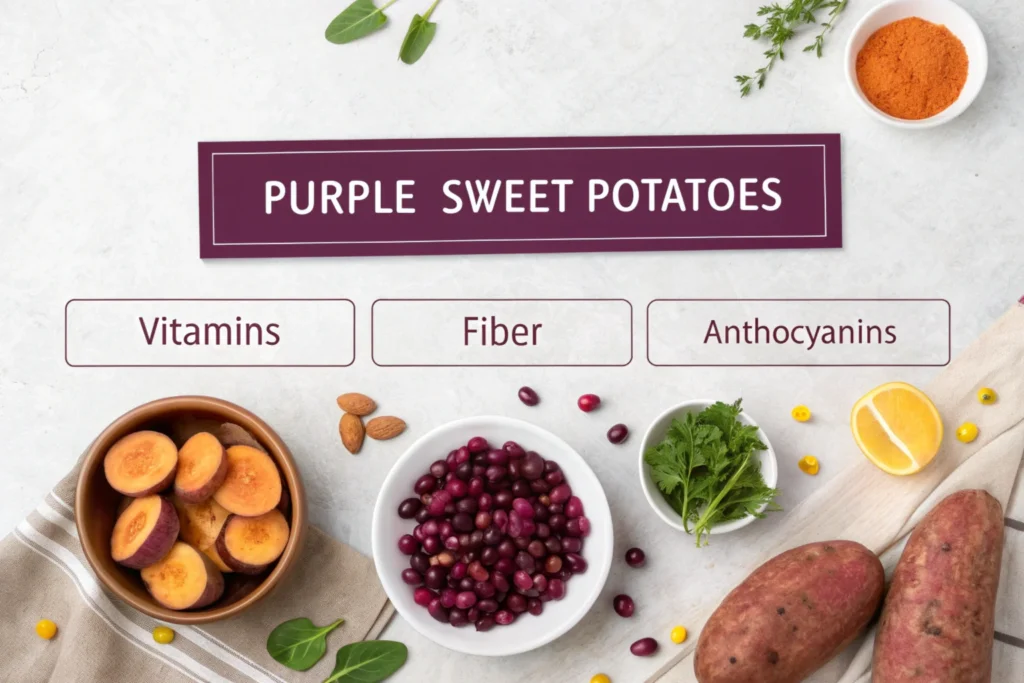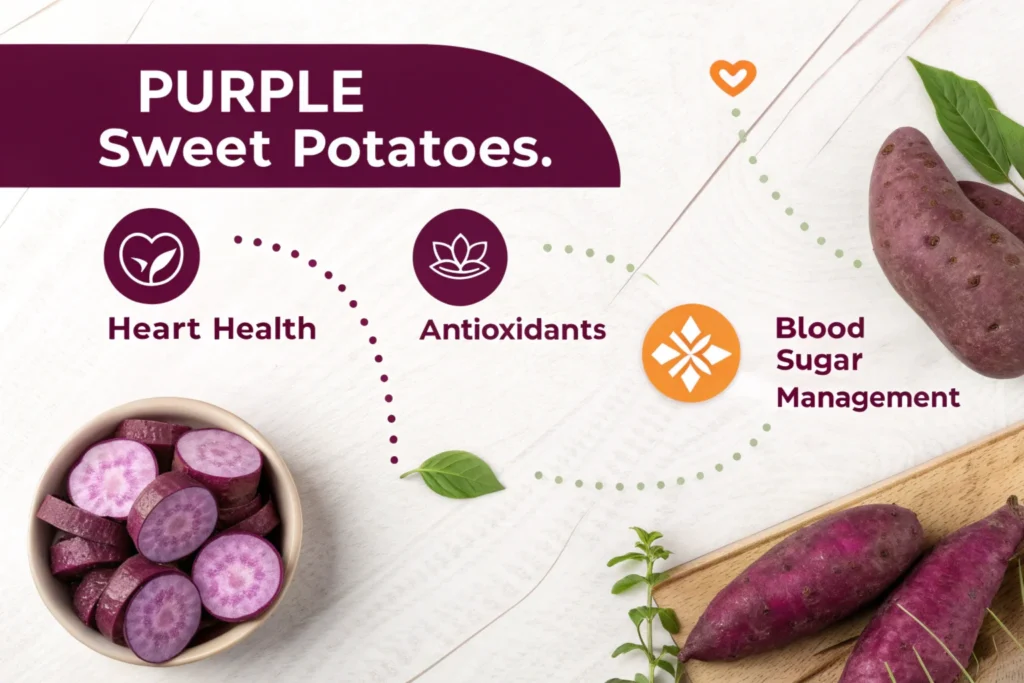Introduction
Purple sweet potatoes are gaining popularity as a superfood due to their vibrant color and potential health benefits. But the key question remains: Are purple sweet potatoes more healthy than other varieties? These colorful tubers are not only visually appealing but also packed with nutrients that can benefit your body in many ways. From their rich antioxidants to their role in supporting heart health, purple sweet potatoes offer numerous advantages that may surprise you.
In this article, we will explore the nutritional value, health benefits, and how they compare to regular sweet potatoes. By the end, you’ll understand why adding purple sweet potatoes to your diet can be a great choice for overall health.
Nutritional Profile of Purple Sweet Potatoes

Macronutrients in Purple Sweet Potatoes
Purple sweet potatoes provide a healthy balance of essential macronutrients that your body needs:
- Carbohydrates: Purple sweet potatoes are a complex carbohydrate source that provides sustained energy. A medium-sized potato contains approximately 24-27 grams of carbohydrates.
- Proteins: While low in protein, they still offer around 2 grams per serving, making them a beneficial addition to balanced meals.
- Fats: Purple sweet potatoes are naturally low in fat, making them a heart-healthy choice.
Rich in Micronutrients
Purple sweet potatoes are a treasure trove of vitamins and minerals, including:
- Vitamin A: Supports eye health, immunity, and cell growth.
- Vitamin C: Enhances the immune system and promotes healthy skin by producing collagen.
- Fiber: Purple sweet potatoes are a good source of dietary fiber, aiding in digestion and maintaining a healthy gut.
- Potassium: Essential for maintaining healthy blood pressure levels and heart function.
Anthocyanins – The Secret Behind the Color
The bright purple hue of these sweet potatoes comes from anthocyanins, powerful antioxidant compounds. Anthocyanins have been linked to various health benefits, including:
- Reducing inflammation
- Improving heart health
- Fighting free radicals that cause cell damage
The combination of antioxidants, vitamins, and fiber makes purple sweet potatoes a nutrient-dense food with substantial health benefits.
Health Benefits of Purple Sweet Potatoes

Antioxidant Properties and Anti-Inflammatory Effects
One of the standout benefits of purple sweet potatoes is their high antioxidant content, particularly anthocyanins. These antioxidants play a key role in combating oxidative stress caused by free radicals in the body. By neutralizing free radicals, anthocyanins can help reduce cellular damage and inflammation.
- Anti-Inflammatory Benefits: Chronic inflammation is linked to various diseases, such as arthritis, diabetes, and cardiovascular disorders. The antioxidants in purple sweet potatoes help lower inflammatory markers, promoting overall wellness.
- Cell Protection: Anthocyanins protect your cells and tissues from damage, which can lead to premature aging and certain chronic illnesses.
Role in Heart Health
Purple sweet potatoes contribute significantly to a healthy heart due to their potassium content, fiber, and antioxidants. Here’s how they benefit cardiovascular health:
- Blood Pressure Management: Potassium in purple sweet potatoes helps regulate blood pressure by balancing sodium levels and relaxing blood vessels.
- Improved Cholesterol Levels: The fiber in purple sweet potatoes aids in reducing bad LDL cholesterol, which can lower the risk of heart disease.
- Antioxidants for Heart Protection: The anthocyanins work to reduce oxidative stress in arteries, which helps improve blood circulation and prevent plaque buildup.
Including purple sweet potatoes in your diet can support a strong, healthy heart, reducing the risk of hypertension and other cardiovascular issues.
For more on heart-healthy cooking techniques, check out Is Cooking on a Traeger Healthy?
Purple Sweet Potatoes for Blood Sugar Management
Despite their naturally sweet flavor, purple sweet potatoes have a low glycemic index (GI) compared to other starchy foods. Here’s why they are beneficial for managing blood sugar levels:
- Slow Sugar Release: The complex carbohydrates and fiber slow down the absorption of sugar into the bloodstream, helping to prevent blood sugar spikes.
- Diabetes-Friendly: Studies suggest that anthocyanins may improve insulin sensitivity and reduce blood glucose levels, making purple sweet potatoes suitable for people with type 2 diabetes.
- Weight Management: The high fiber content keeps you feeling fuller for longer, reducing unnecessary snacking and calorie intake.
Looking for other nutritious meal options? Explore Low Carb Pasta Options for healthy and satisfying recipes.
By regulating blood sugar and promoting satiety, purple sweet potatoes can be a valuable addition to a diabetes-friendly diet.
Potential for Cancer Prevention
The antioxidants in purple sweet potatoes are also believed to have anticancer properties. Research suggests that anthocyanins can:
- Inhibit Cancer Cell Growth: Anthocyanins may slow the growth of certain cancer cells, including colon and breast cancer.
- Enhance Cell Repair: By fighting oxidative stress, anthocyanins help prevent DNA damage, which can lead to the formation of cancer cells.
- Strengthen Immunity: The vitamins and antioxidants in purple sweet potatoes boost the immune system, improving the body’s ability to fight diseases.
While more research is needed, adding purple sweet potatoes to your diet can be a natural and tasty way to reduce cancer risks and support long-term health.
Purple Sweet Potatoes vs. Orange Sweet Potatoes

When comparing purple sweet potatoes to their more common orange counterparts, it’s important to look at their nutritional profiles, health benefits, and culinary uses. While both are healthy, purple sweet potatoes stand out in certain areas.
Nutritional Differences
Here’s a side-by-side comparison of the nutritional highlights of purple sweet potatoes and orange sweet potatoes per 100 grams:
| Nutrient | Purple Sweet Potatoes | Orange Sweet Potatoes |
|---|---|---|
| Calories | 86 kcal | 90 kcal |
| Carbohydrates | 20 g | 21 g |
| Dietary Fiber | 3.3 g | 3.0 g |
| Vitamin A | 800 IU | 14,000 IU |
| Vitamin C | 12 mg | 19 mg |
| Potassium | 450 mg | 475 mg |
| Antioxidants (Anthocyanins) | High | Low |
Key Takeaways:
- Vitamin A: Orange sweet potatoes are a richer source of Vitamin A due to their beta-carotene content.
- Antioxidants: Purple sweet potatoes excel in anthocyanins, which are powerful antioxidants not found in orange varieties.
- Fiber and Potassium: Both varieties are excellent sources of fiber and potassium, supporting digestion and heart health.
Health Benefits Comparison
Both types of sweet potatoes are nutritious, but the health benefits they offer differ slightly:
- Purple Sweet Potatoes:
- Rich in anthocyanins for better antioxidant activity.
- Anti-inflammatory properties support heart health and reduce oxidative stress.
- Suitable for blood sugar control due to their low glycemic index.
- Orange Sweet Potatoes:
- High in beta-carotene, which converts to Vitamin A and supports eye health.
- Excellent for boosting the immune system due to higher Vitamin A levels.
In summary, while orange sweet potatoes focus on Vitamin A, purple sweet potatoes are better for antioxidants and blood sugar management. Both are healthy, and including both in your diet can provide balanced nutrition.
Flavor and Culinary Uses
Purple sweet potatoes have a slightly earthy and nutty flavor compared to the sweeter, creamier taste of orange sweet potatoes. Their versatility allows for a variety of culinary uses, including:
- Savory Dishes: Baked, roasted, or mashed as a side dish.
- Sweet Treats: Purple sweet potatoes work wonderfully in desserts like cakes, muffins, and puddings.
- Salads: Add boiled purple sweet potato cubes to salads for a nutritious boost.
Discover more about creative low-carb recipes by reading What Noodles Can You Eat on Keto?
| Cooking Method | Purple Sweet Potatoes | Orange Sweet Potatoes |
|---|---|---|
| Baking | Enhances their earthy flavor | Intensifies natural sweetness |
| Boiling | Preserves their color and nutrients | Softens texture and sweetens flavor |
| Steaming | Keeps them firm and nutrient-dense | Retains moisture and softens texture |
How to Incorporate Purple Sweet Potatoes Into Your Diet

Adding purple sweet potatoes to your daily meals is easy and delicious. Here are some ideas to get you started:
Cooking Methods
- Baking: Roast purple sweet potatoes in the oven with a drizzle of olive oil and herbs for a crispy, savory dish.
- Boiling: Boil them for 10-15 minutes to use in salads, soups, or mashed dishes.
- Steaming: Steam slices of purple sweet potatoes to retain their nutrients and natural flavor.
If you enjoy simple and hearty meals, try out these Keto Crockpot Recipes for inspiration.
Healthy Meal Ideas
- Purple Sweet Potato Salad: Combine boiled purple sweet potato cubes with greens, cherry tomatoes, and a light dressing for a nutritious salad.
- Purple Sweet Potato Soup: Puree steamed purple sweet potatoes with vegetable broth, garlic, and onions for a creamy, antioxidant-rich soup.
- Mashed Purple Sweet Potatoes: Mash boiled purple sweet potatoes with a touch of olive oil and season with salt, pepper, and herbs.
- Breakfast Bowls: Use baked purple sweet potato slices as a base for a bowl topped with yogurt, nuts, and a drizzle of honey.
Easy Recipes
- Purple Sweet Potato Fries: Cut purple sweet potatoes into thin strips, toss with olive oil and paprika, and bake until crispy.
- Purple Sweet Potato Smoothie: Blend steamed purple sweet potatoes with banana, milk, and a pinch of cinnamon for a creamy, nutrient-packed smoothie.
- Dessert Option: Use mashed purple sweet potatoes as a base for pancakes or muffins to add color and nutrients to your desserts.
Incorporating purple sweet potatoes into your diet doesn’t just make your meals colorful – it boosts your overall health in creative, enjoyable ways.
Common Myths About Purple Sweet Potatoes
Purple sweet potatoes are becoming increasingly popular, but with their rise come a few misconceptions. Let’s clear up the most common myths surrounding this vibrant superfood.
Myth 1 – Are Purple Sweet Potatoes Genetically Modified?
One widespread myth is that the unique purple color of these sweet potatoes is due to genetic modification. This is false. Purple sweet potatoes are naturally occurring and have been cultivated for centuries, particularly in parts of Asia and South America.
- The purple hue comes from anthocyanins, the same natural pigments found in blueberries, red cabbage, and black rice.
- Farmers have selectively bred purple sweet potatoes over time for their color, taste, and nutritional benefits, but they are not genetically engineered (GMO).
Myth 2 – Do Purple Sweet Potatoes Have Side Effects?
Some people believe that consuming purple sweet potatoes may lead to digestive discomfort or other side effects. However, when eaten in moderation, purple sweet potatoes are perfectly safe and healthy for most people.
- Fiber Content: The high fiber in purple sweet potatoes aids digestion but can cause bloating or gas if eaten in excess. This is common with all fiber-rich foods.
- Blood Sugar Concerns: Despite their sweetness, purple sweet potatoes have a low glycemic index, which helps prevent blood sugar spikes.
For individuals with specific medical conditions, it’s always best to consult a doctor before making significant dietary changes.
Myth 3 – Are Purple Sweet Potatoes High in Sugar?
While sweet potatoes contain natural sugars, they are far from being unhealthy. Purple sweet potatoes have complex carbohydrates and fiber, which slow down the absorption of sugar in the bloodstream.
- Compared to refined carbs or processed sugary foods, purple sweet potatoes provide a more sustained energy source.
- Their low glycemic index makes them suitable for people with diabetes or those watching their blood sugar levels.
Myth 4 – Do Purple Sweet Potatoes Taste Bad?
Another misconception is that purple sweet potatoes are less tasty compared to their orange counterparts. In reality:
- Purple sweet potatoes have a mildly earthy, nutty flavor with a slightly sweet undertone.
- Their unique texture makes them perfect for both savory and sweet recipes.
Cooking them the right way—through baking, steaming, or boiling—enhances their flavor and versatility.
Frequently Asked Questions (FAQs)
Are purple sweet potatoes healthier than regular?
Yes, purple sweet potatoes offer unique health benefits compared to regular sweet potatoes. They are rich in anthocyanins, powerful antioxidants that help combat inflammation and oxidative stress. While regular sweet potatoes are higher in beta-carotene (Vitamin A), purple sweet potatoes excel in antioxidant content, making them an excellent choice for overall health.
Which color sweet potato is the healthiest?
The health benefits of sweet potatoes vary by color:
- Orange sweet potatoes are high in beta-carotene, which supports eye health and immunity.
- Purple sweet potatoes are packed with anthocyanins, which have anti-inflammatory and antioxidant properties.
- White sweet potatoes are lower in antioxidants but still provide essential nutrients like fiber and potassium.
Among these, purple sweet potatoes are often considered the healthiest due to their exceptional antioxidant levels.
Which sweet potato is the world’s healthiest?
While all sweet potatoes are nutrient-dense, purple sweet potatoes are often recognized as the world’s healthiest due to their high concentration of anthocyanins. These antioxidants are linked to reducing inflammation, improving heart health, and protecting against chronic diseases. Additionally, purple sweet potatoes have a low glycemic index, making them ideal for blood sugar control.
Are purple potatoes the healthiest potato?
Yes, purple potatoes, including purple sweet potatoes, are often considered the healthiest among all potato varieties. Their vibrant color indicates a high level of anthocyanins, which provide numerous health benefits, including:
- Reducing oxidative stress
- Fighting inflammation
- Supporting heart health
Compared to white potatoes, purple potatoes have more antioxidants and a lower glycemic index, making them a healthier option for most people.
Conclusion
Purple sweet potatoes are more than just visually striking—they are packed with exceptional health benefits that set them apart from regular sweet potatoes. Their high concentration of anthocyanins gives them powerful antioxidant and anti-inflammatory properties, which can help reduce oxidative stress, improve heart health, and support blood sugar management.
While orange sweet potatoes are rich in beta-carotene (Vitamin A), purple sweet potatoes excel in their unique ability to fight free radicals and protect against chronic diseases. Incorporating them into your meals provides a nutrient-dense, low-glycemic, and delicious option for maintaining overall health.
By including purple sweet potatoes in your diet through a variety of cooking methods and recipes, you can enjoy their earthy flavor while reaping their numerous health benefits. Whether roasted, steamed, or used in creative recipes, these vibrant tubers are a fantastic addition to a balanced, healthy lifestyle.

